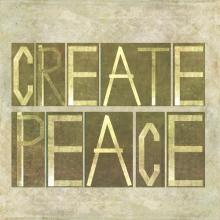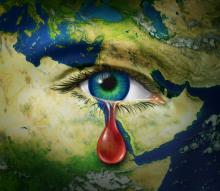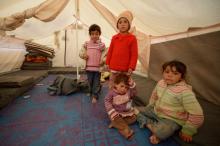civil war

As President Barack Obama prepared to address the nation on Tuesday evening to articulate a plan for intervention in Syria, NBC rushed to assure its viewers that the Ryan Seacrest-hosted game show, The Million Second Quiz, would not be interrupted. As detailed by the network, the president would speak for only 15 minutes, thus viewers could watch their televisions with full confidence that the entirety of the hyped-up program would be fully protected. While there was suspense as to whether NBC would follow through on its promise of an unbroken telecast, the presidential coverage stayed within the agreed upon time slot, viewers were able to watch their regularly scheduled program, and all was well in the world.
In the meantime, all is not well in the world.

As the United States prepares to “officially” become involved in the Syrian war, Christian pacifism has reemerged as a much-discussed and relevant topic. Unfortunately, the concept has been somewhat misrepresented, undervalued, and often downright demonized within evangelical communities.
Critics often assume Christian Pacifism is some sort of radical political movement associated with marijuana-smoking hippies who are anti-government conspiracy theorists. To make matters worse, pop-culture (and much of Christian culture) has made pacifism seem, well, passive — as if pacifists are unpatriotic and un-American heretics who refuse to enlist in the military and avoid physical confrontations at all costs. They are characterized and perceived as weak, scared, and gutless.
In reality, the beliefs that form Christian pacifism are spiritual and scripturally founded around the life of Christ. And whether you agree with the theology, it’s hard to passively dismiss the Biblical argument for pacifism as some sort of crazy mumbo-jumbo.

As the Obama administration readies for a probable military strike against Syria, Religion News Service asked a panel of theologians and policy experts whether the U.S. should intervene in Syria in light of the regime’s use of chemical weapons against civilians. Would the “Just War” doctrine justify U.S. military action, and what is America’s moral responsibility? Here are their responses, which have been edited for clarity.

During the July 1-3, 1863 Battle of Gettysburg, there were Christians and Jews on both sides of the conflict who knew the answer to the question “Whose side is God on?”
Or at least they thought they did.
In 1861, Confederate President Jefferson Davis declared: “Our cause is just and holy,” and the South self-assuredly adopted as its motto Deo vindice (“God will vindicate us”). In the same year, Julia Ward Howe composed the “Battle Hymn of the Republic” with the triumphant words: “He hath loosed the fateful lightning of His terrible swift sword. … I have seen Him in the watch-fires of a hundred circling camps. … Glory, glory Hallelujah, His truth is marching on.”

What the heck is going on in Syria? If you are like me, you have a problem keeping all the players straight, and the unfamiliar Arab names don’t help. Thankfully, the Syrian president has a relatively easy name to remember, Bashar al-Assad, but keeping track of who’s who and which side they’re on is a real challenge. Frankly, even when I can keep track, I’m very skeptical that I am getting anything close to the truth from news outlets, the White House, or our State Department. The talk about a “red line,” no-fly zones, arming terrorists, and weapons of mass destruction sounds a lot like the falderal we were being fed going into the Iraq war. So what’s a good citizen of the world to do? If I can’t make sense of the news accounts myself, who can I find to help me out? And if I can’t trust my government to sort out the good guys from the bad guys for me, how can I ever figure out what, if anything, my government should be doing in my name?

Our ministry with the Mafraq Church helped us see the desperate need for volunteers and funds to help the Church continue this vital ministry. Thousands of Syrians continue to make their way to Jordan fleeing the violence. Already more than 500,000 Syrian refugees live in Jordan. The refugee camps are overcrowded. We visited the Zatari Camp that has become home to more than 130,000 people. As far as the eye can see, the visitor can observe row after row of tents and small mobile units. The main street is packed with refugees while numerous shops, vendors, makeshift hospitals, and NGO distribution centers have sprung up in response to the plight of the refugees.
Other refugees are finding temporary residence in rooms, apartments, and warehouses in towns and cities outside the camp. The number of refugees in Mafraq has even surpassed the number of Jordanian residents. Church volunteers distributed basic items such as mattresses, blankets, small gas cookers, and gas containers. In addition, we delivered food baskets containing $50.00 worth of groceries to each family we visited.

Corruption has gone too far. The righteous must break away. Hope now rests with a holy remnant that will honor foundational texts.
The message sounds familiar. A church schism? No, mounting calls for secession from the United States.
Since President Barack Obama won re-election, more than 750,000 Americans have petitioned the White House website to let their respective states secede, from Alaska to Iowa to Maryland and Vermont. Those leading the charge are framing it, observers say, in terms that suggest a deep-seated religious impulse for purity-through-separation is flaring up once again.
But this time, it’s playing out on a political stage.
“Today's secessionist movements are just the latest example of a long parade of breakaway groups [in American history] seeking to restore some lost ideal,” said Peter J. Thuesen, professor of religious studies at Indiana University-Purdue University Indianapolis. “The problem is that the ideal is invariably a mirage.”

Physical violence is what happens when the violent force of words is not enough.
It’s possible that we are just beginning to see the start of that in our world today. The words, language, and rhetoric within politics and religion is growing in intensity all the time. Insults, name-calling, and unfounded accusation are normal and even expected.
When one side is called out for their language, they simply excuse themselves, pointing out that their opponent is doing the same thing. So it goes. But what happens when the force of the rhetoric reaches its limit? Violence.

Here it is, the “resolutionary” iPad3, with breakthrough retina display, quad-core processor and 4G LTE wireless connectivity. This next-generation technology is captivating and if you’re an Apple fan, as I am, you’re going to want to trade in your iPad2 and put your name on the waiting list for the iPad3.
And yet, as a human rights activist, it gives me pause. With the innovation of the iPad 3, comes some critical missing features — including conflict free minerals from eastern Congo. To date, Apple has been a leader on this issue, but I know they can do more.

During a roundtable chat with a group of emerging young evangelical leaders recently, someone posed the question: “Has America become a post racial society?”
Well, we haven’t had a race riot in a while — does that mean race isn’t relevant anymore?
A black president just gave the State of the Union Address. How about that? Does that mean America’s OK with the race thing?
Our nation is a more ethnically diverse nation than it’s ever been. Does that count for anything?
Scholars across disciplines agree that what we think of as “race” literally was invented here in the 17th century to delineate castes within a system of extreme privilege and subjugation.
So, rather than thinking about the dreaded word, “racism,” to answer the question, perhaps it would be more helpful to think about how our society has been “racialized” and then ask if such a racialization still exists or reverberates in today's American culture.
Two long pieces this weekend described "one hell of a killing machine," and "the dark matter
Could nonviolent resistance have succeeded in Libya? Here are four points worth considering:
1) The movement was fairly spontaneous, unlike the highly coordinated campaign in Egypt. As Peter Ackerman consistently points out, planning is an essential element to a successful nonviolent revolution. As with any battlefield, a nonviolent campaign requires extensive preparation. But reports seem to indicate that Libyans began protesting in earnest around Feburary 15th, likely inspired by events in neighboring Egypt and Tunisia. Gadhafi seemed prepared for this and immediately cracked down using overwhelming violence. By February 19th, the movement had become violent in response to these crackdowns. Four days of civil resistance doesn't give it much time to work. Egyptian pro-democracy activists struggled for years before seeing Mubarak fall. Syrian oppositionists, thousands of whom have been killed by Bashar al-Assad's regime, have toiled along for the past six months. So, we can't really say whether or not nonviolence would have worked in Libya. It never had a chance to materialize in the first place.
Yesterday I received my email copy of ePistle, Evangelicals for Social Action’s weekly electronic communication. This article discussing the situation in the Ivory Coast and the former president Laurent Gbagbo immediately caught my attention:
“The Ivory Coast is on the brink of civil war, and chocolate companies could play a critical role in saving lives and bringing peace.